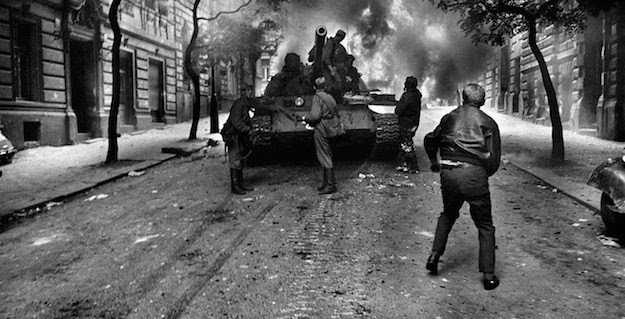
The dramatic billboards that went up on Vítězné náměstí last week, reminding us of the events of that day, caused me to stop and stare at them for quite some time. Of course for Czechs of my age, they can invoke some painful memories that may still be hard to bear. Their lives changed for the worse, their opportunities to develop, learn, travel, limited for years, while I enjoyed those opportunities to the full. But those days made a lasting impact on me too, and created such a lasting interest in this part of Europe, that I eventually made it my home.
Protest to the Slovak Ambassador, re police intimidation of Czech journalist, Pavla Holcová
To: emb.prague@mzv.sk
Dear Ambassador Weiss,
10 ways in which TV Prima let down Czech citizens
Last night’s Czech Presidential debate, presented by TV Prima, was an offence to a mature democratic society. Whether it was down to lack of professionalism, or something more deliberate, is something I cannot judge, although many people have views. And maybe it is easy for me to criticise, having been brought up with the BBC. Maybe thanks to that upbringing, it isn’t difficult for me to identify 10 ways in which TV Prima let themselves, and the country, down:
The continuing mess of Brexit; Part 2
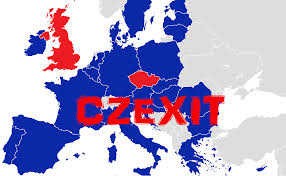
Before you Czexit, check out Brexit!
Czechs are apparently among the most Eurosceptic peoples in the EU. While the results in the latest Eurobarometer show an improvement in attitudes towards the EU, Czechs still appear to be far more negative than the Poles, the Slovaks or even the Hungarians. The reasons behind this deserve discussion in a separate blogpost, but the upshot is that certain politicians, particularly the far-right politician Tomio Okamura, have encouraged talk of a referendum on EU membership. So for any Czech citizens reading this who feel persuaded that Czexit might be a good thing, I urge you to consider the following insights from the Brexit referendum :
The continuing mess of Brexit, and what Czechs can learn from it (part 1)
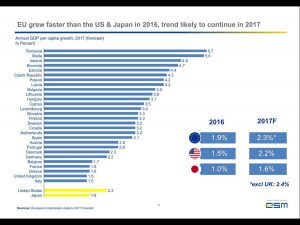 Part One – why it is (probably) happening
Part One – why it is (probably) happening
Brexit hasn’t happened yet. 18 months on from the referendum, the British are hardly any clearer about what their country and their lives will be like after it leaves the EU; and this despite the fact that every single day, something to do with Brexit dominates the serious news channels.
At the very least, it has become clearer to many who voted for Brexit that the process of leaving the EU is far more complex than their political leaders had claimed. I doubt that on the day of the referendum more than 5% of the population could correctly state what Euratom is, or that the European Court of Human Rights is not an EU institution. Well, now they are finding these things out. Drip, drip, drip…the truth about Brexit comes out in little drips.
What’s really wrong about Uber. It’s not the app…

On October 2nd, Prague’s taxi drivers, with their brilliant sense of PR, decided once again to protest about Uber by blockading the airport. What great memories all the tourists will have of their weekend in Prague. But this time, the taxi drivers seemed to have some international allies . A few days earlier, in a move that really attracted global interest, Uber lost its licence to operate in London. It reminded people that Uber had problems in other parts of the world too.
The arguments roared into life in both London and Prague. In both cities many people felt Uber were giving them a cheaper alternative to “expensive” taxi drivers. Young people in particular argued that taxis are ‘the past”; Uber with its app and its new way of working with drivers was part of the cool new world, together with AirBnB. Uber of course have encouraged that thinking. But in fact, the arguments in the two cities are not the same, and I would like to describe the difference to you.
But more importantly, thanks to an article in a really obscure London magazine devoted to London transport issues, I will show you that the real problem with Uber is one that the mainstream media has not picked up. In fact, I don’t think even the Czech Minister of Transport, Dan Tok, has picked it up yet. I hope he may read this…
Vladimir Šmicer should show fans more respect.
I was really surprised to learn of Vladimir Šmicer’s comments regarding fan protests at Sparta, and especially his assertion that such protests don’t happen in England. As I will show, this assertion is completely wrong.
It is 12 years since Šmicer left England. In that time, the money in English football has grown to an almost ridiculous level, and clubs have been bought by owners or companies who have not always had the best intentions. Šmicer focuses on Sparta fans protesting about the coach, but he surely knows that the fans are more discontent with the ownership of Daniel Kretinsky. Here for the benefit of Mr Šmicer is a quick tour around the many clubs whose stadia he has played at, where fans have recently been protesting against owners.
Where better to start than at Šmicer’s old club, Liverpool. Here they are in February last year, protesting about ticket prices. They walk out of the stadium on 77 minutes.
In exactly the same month, fans of once mighty Leeds United, owned by a clearly mad Italian with a criminal record, Massimo Cellino, used a projector to beam their protest messages onto the side of the stadium
Of course Manchester United have been protesting for much longer about the ownership of the Glazier family. Some have gone so far as to set up a new club, FC United of Manchester, which now has its own stadium and often attracts around 5,000 fans (about the same as Slavia on a bad day..)
Blackburn Rovers, once champions, are now in the 3rd division under the ownership of the Venky family of India. They have made their money in chicken farming, so fans recruited a live chicken to help their protests.
https://www.youtube.com/watch?v=FYWI3XXfExw
There have been protests against the owners of Newcastle, Aston Villa, Hull City, Cardiff, and Coventry in the years since Šmicer last played in England. I would like to think that among the most creative protests are those at my club, Charlton Athletic. Šmicer played against Charlton in the Premier League, but under the bizarre ownership of Belgian businessman Roland Duchatelet we are now, like Blackburn, in the 3rd division
Šmicer describes the protesting fans as ‘radicals’. It is certainly true that protests usually come from those parts of the stadia where the noisiest fans congregate, but he is quite wrong if he thinks that most fans disapprove of the protests at English clubs. I doubt he knows what the non -radical Sparta fans think of the current ownership regime either. He speaks of the ‘respect’ shown by fans in England, which he says is missing here in the Czech Republic. He seems to suggest that fans should respect club owners. Well, Mr Šmicer, in England, respect has to be earned. The problem in the cases I have shown above is that club owners have dis-respected fans. Even in the often empty stadia of the Czech league it remains true that without the fans, football is irrelevant. Mr Šmicer will remember the wonderful English coach, Sir Bobby Robson. But he may have forgotten one of Sir Bobby’s most famous quotes:
“What is a club in any case? Not the buildings or the directors or the people who are paid to represent it. It’s not the television contracts, get-out clauses, marketing departments or executive boxes. It’s the noise, the passion, the feeling of belonging, the pride in your city. It’s a small boy clambering up stadium steps for the very first time, gripping his father’s hand, gawping at that hallowed stretch of turf beneath him and, without being able to do a thing about it, falling in love.”
TV Nova’s election debate plan is an affront to democracy

We Westerners who arrived here soon after the fall of Communism took some time to learn a lesson: Democracy is not just a light that you switch on, and everything in the room becomes just like at home. With hindsight that is obvious, but the question then is, how long does it take before a country can be said to have a “mature” democracy?
Judging by the recent actions of TV Nova, the answer seems to be “ longer than 28 years”. Of course TV Nova was widely welcomed when it started in 1994 as a symbol of a democracy, in a country where a totalitarian State had controlled media absolutely. However it quickly abandoned its initial promises to provide quality programme and became a typical commercial TV station, whose main goal was to maximise TV ratings.
Thank you for visiting. Is it worth staying?
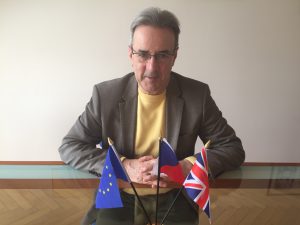 This is a strictly amateur blog, and my only ambition is to be able to say that, as an active citizen in a democracy, I made my voice heard. I was taught that democracy can never be taken for granted, every citizen must work to protect it every day. In the last couple of years it seems more important than ever to work at it. I am a modern citizen of Europe, somebody who lives with a foot in more than one country, consuming the media and joining in the dialogue in both my country of residence and that of my birth. Now the country of my birth is proposing to leave the EU; a real-estate dealer with a big mouth is US President, and a Slovak with a murky past will probably become Prime Minister of the Czech Republic. And yet, the fightback of the ‘moderates’ has begun, first in Austria, then in the Netherlands, then in France, and now in Germany. Which way will my two countries go? What does my life in one country tell me about the things that happen in the second one? I hope that this will be a sufficiently unusual perspective to make my posts interesting, sometimes, to some readers. You are welcome to comment and I will do my best to reply where appropriate.
This is a strictly amateur blog, and my only ambition is to be able to say that, as an active citizen in a democracy, I made my voice heard. I was taught that democracy can never be taken for granted, every citizen must work to protect it every day. In the last couple of years it seems more important than ever to work at it. I am a modern citizen of Europe, somebody who lives with a foot in more than one country, consuming the media and joining in the dialogue in both my country of residence and that of my birth. Now the country of my birth is proposing to leave the EU; a real-estate dealer with a big mouth is US President, and a Slovak with a murky past will probably become Prime Minister of the Czech Republic. And yet, the fightback of the ‘moderates’ has begun, first in Austria, then in the Netherlands, then in France, and now in Germany. Which way will my two countries go? What does my life in one country tell me about the things that happen in the second one? I hope that this will be a sufficiently unusual perspective to make my posts interesting, sometimes, to some readers. You are welcome to comment and I will do my best to reply where appropriate.
British Justice has failed Zdeněk Makar
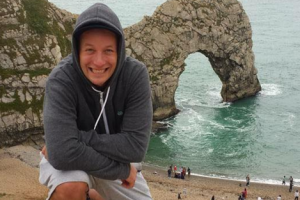
Part 1
There are many things wrong with British society, and I have never been afraid to speak of them to Czechs; I hope that then, if I claim something about Britain is really good, they will believe me rather than just suppose I am being “patriotic”.
One of those good things, I always argue, is the British justice system. When I first heard the dreadful news of the murder of Czech citizen, Zdeněk Makar, in London last autumn, I tried to reassure my Czech friends that our police will get the killer, and he will face justice.
The police did their job. Raymond Sculley was very quickly arrested and charged with murder. It’s usually a good sign, when an arrest and charges follow quickly. It suggests the police have received clear and damning evidence. In the meantime details had emerged of “Zed” in the press and social media. I quickly gained the impression of a hard-working and able young man who had gone to Britain to build a career and enrich his life experience, and was clearly succeeding. He had a group of friends there from the Central European countries, equally decent, and now horribly bereft. They organised a fund to ensure he could be returned home to lay to rest.
